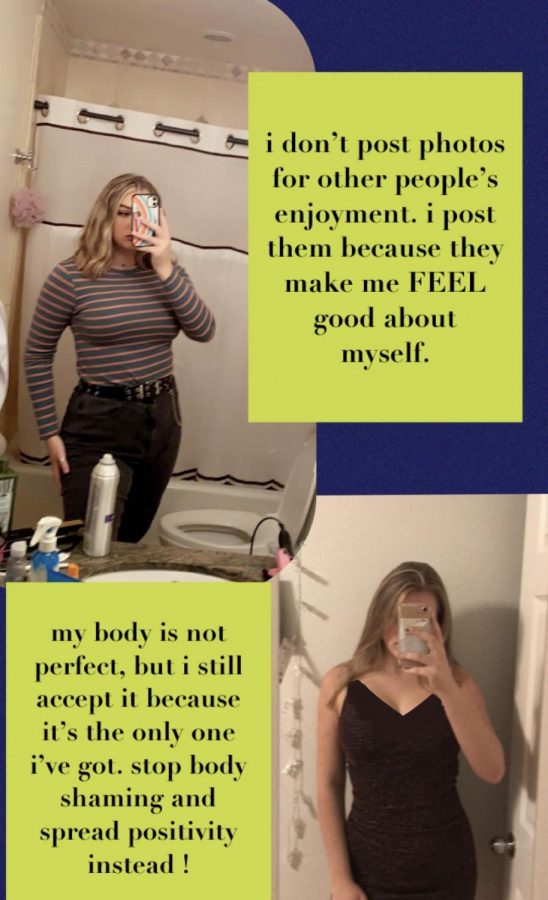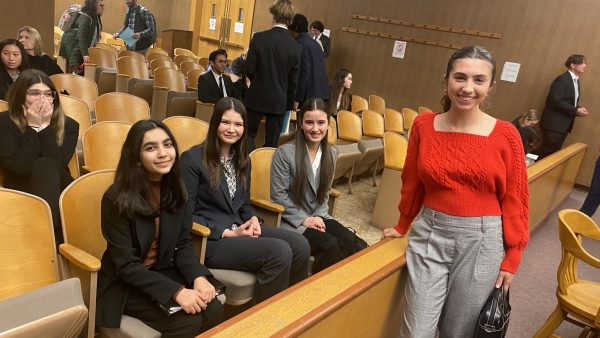Body Positivity Movement Q&A With Sam Sutter
The Catalyst / Sam Sutter
Sam Sutter takes to her social media to express her passion for body positivity and acceptance.
This month, we celebrate National Eating Disorder Awareness Week from February 23 to March 1. Self-love and body positivity are necessary when it comes to accepting who you are and embracing it. Maggie Stack, a senior at NDB, started a social media movement over the summer when she received shameful comments about her body. Now, it is important to revisit this movement during February to remind ourselves why body positivity is needed in society. Sam Sutter, another senior at NDB, participated in this movement along with many others and shared her battles with self-love.
The Catalyst (TC): Our generation practically grew up on social media. Would you say this has affected the way young girls see themselves and their bodies?
Sam Sutter (SS): Definitely. I think constantly seeing all the celebrities or Instagram models I think it affects young girls because they see skinny or the ideal body and it makes girls feel like they have to look like that when every body is built differently. Some people just can’t look like that no matter how hard they try. They can’t lose that much weight like it’s impossible because their body just isn’t built like that and I think it’s hard to see because it enforces the idea that you have to look like that.
TC: For you, how has social media impacted your self-image? Have certain things made it better or worse?
SS: I think being someone who’s not super tiny, like both tall and like size-wise, it’s been hard growing up with social media and being a teenage girl. You’re constantly seeing all these girls that are tinier than you and that’s what people find attractive, or at least that’s what you’re told. I think social media has played into that as well because I see girls my age posting and they are so much smaller than me and I’m like, why can’t I be that small, but I’m one of those bodies it would be impossible for me to ever be that tiny, but I think it’s made it hard to you know to be okay with that fact.
TC: When you saw Maggie’s post about the comment she received that triggered her movement for body positivity on social media, how did you react? How did you feel and what brought you to want to join in?
SS: Well I was mad because it was not only completely uncalled for and rude because she doesn’t even know the person and the person doesn’t know her, but it was so untrue. And so, just contributing to the horrible misogyny that women have to deal with, where you know guys can post shirtless photos all the time and they never get any hate for it but as soon as a girl wants to post in a bikini, they get called horrible names and it’s just ridiculous that there’s a double standard that men can walk around with no shirt and shorts and people won’t say anything but as soon as a woman wears a bathing suit it’s a huge deal. I wanted to join in because I’ve experienced name-calling like that too, and I’ve experienced sexualization when I wasn’t even wearing something that would be considered sexual like a bathing suit or jeans and a T-shirt. So I wanted to contribute to her movement because it’s something that I think there needs to be more awareness of and action is taken.
TC: Social media has allowed people’s messages to reach huge audiences of people. How can this be positive or negative?
SS: I think it’s really powerful and helpful for things like what Maggie started or things with the Black Lives Matter movement or cases, small cases that aren’t well known so that they can get more exposure, and that way it’s positive because it helps raise awareness and like shows people that, hey, these injustices are happening, and here’s what you can do to help, even though you’re just one person you can still do something. But I do think it can be negative sometimes because it’s not always the right message that’s being put across like say you’re scrolling through TikTok and then all the sudden you see something that’s like really triggering or and it’s like, that shouldn’t be out there going viral with so many people seeing it. In a lot of ways, it is good, but it can also be harmful if the wrong message is being spread.
TC: Overall, what is some advice you would give to those who are struggling with how they view themselves?
SS: It’s a battle that I think pretty much everyone faces everyday. And that doesn’t mean that it’s not important, it’s incredibly important, but you know you’re not alone. And you may look at someone and say, wow they have such a good body, they’re so tiny, I wish I could look like that. And they’re thinking that they don’t like what they see in the mirror as well. I think there’s so much preaching about loving your body and all that and of course, that is important but I think when you’re in such a headspace that you hate your body or hate the way you look, the first step is to get into a place of accepting your body and respecting your body and realizing this thing is keeping me alive. And just to, you know, accept it, and I may not love it right now but I don’t need to hate it.










